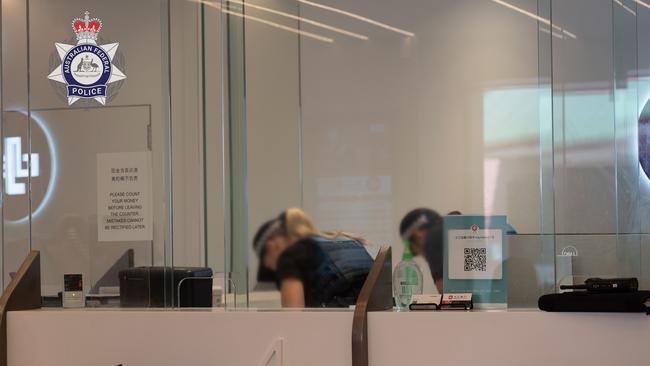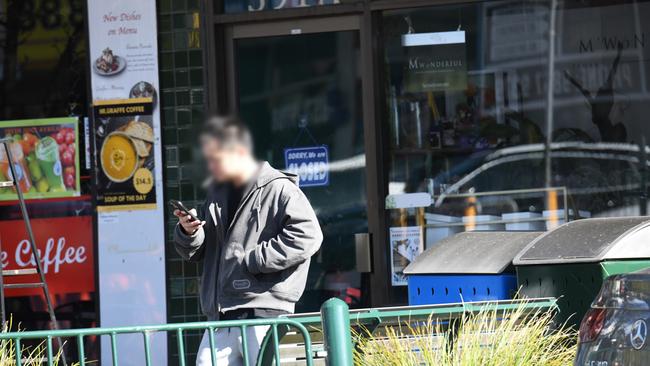The secret to their alleged criminal success was simple; there was no secret.
Or at least that’s what they wanted everyone to think.
With a network of “shiny” shopfronts in NSW, Victoria, Western Australia, South Australia and Queensland trading as the Changjiang Currency Exchange, the Australian Federal Police says the alleged Long River crime syndicate was hiding in plain sight for at least three years.
Money-laundering operations traditionally flourish in the dark as they wash the proceeds of crime around the globe, but with a dozen high-profile outlets across Australia, Changjiang promoted itself as a reputable money transfer operation.
As the Changjiang website boasts: “Changjiang is a legitimate operating company approved by the Commonwealth of Australia, and the financial registration number for the Financial Transactions Report and Analysis Center (AUSTRAC) in the Australian capital is 100-572684.
“We are registered with AUSTRAC on the Remittance Sector Register and are subject to obligations under the Anti-Money Laundering and Counter-Terrorism Financing Act 2006. You can check our registration status on the AUSTRAC website.”
In the website’s “frequently asked questions” section, the company was even more bullish about the integrity of its business.
“Changjiang Currency Exchange is a legitimate operating company approved by the Australian government, and all the transactions and funds you have received in Changjiang swap are protected and supervised by Australian law and the Australian Financial Transactions Reporting and Analysis centre.
“Changjiang Currency Exchange has extensive business relations and selective trading with many banks and financial institutions. Changjiang has maintained a high turnover and high credibility in the industry, from the source to obtain more preferential wholesale exchange rate. Changjiang provides customers with integrity, professional, quality, efficient currency exchange and global remittance one-stop service.”
AFP Assistant Commissioner Stephen Dametto said the Changjiang front operation was carefully designed to present as a legitimate part of the finance industry.
“The AFP will allege the Changjiang Currency Exchange was able to hide its illegal behaviour because it looked like a legitimate and lawful money remitter,’’ he said.
“The reason why this investigation was so unique and complex was that this alleged syndicate was operating in plain sight with shiny shopfronts across the country – it was not operating in the shadows like other money-laundering organisations.”
Legal instructions
In fact, Changjiang was careful to remind its customers that there were laws covering its operations and they should abide by them.
“There is no limit if the amount received is through bank transfer. However, you should not exceed $10,000 AUD including transfer fees if by cash, or a proof of the source of your cash will be required for the amount over $10,000 AUD, e.g. withdrawal receipts, payslips etc,” the company states on its website.
“For all remittances, at a minimum, you will be required to provide the sender’s account name, payee’s address, bank account or card number, detailed name and address of the bank. In addition, it is best to provide the beneficiary bank’s International Remittance code (SWIFT code) or the Bank’s branch code (such as Australia’s BSB code, UK’s sort code, ABA code or routing number in the United States, IBAN number in Europe, etc.). So that your money can be arrived at the designated account accurately in the shortest time.
“Changjiang Currency Exchange can provide you with a more competitive exchange rate to minimise your costs in transactions. In addition, Changjiang can provide more flexible trading and services models than banks with faster service and lower service fees.
“Please notify Changjiang Currency Exchange immediately, we will help you to re-transfer to the correct account after receiving the refunds.
“Also, if we receive a refund first, we will contact you to arrange a further remittance. Of course, we also remind you that when you first submit your account information to us, please make sure that the information is accurate as much as possible.”
‘Moving their money’
But behind Changjiang shopfronts, the AFP alleges, it was anything but above-board, as seven Long River bosses pulled criminal strings to wash at least $229m in dirty cash in and out of the country – hidden among more than $10bn in legitimate transfers – in just three years.
Most of that money was criminal gangs allegedly moving their money offshore, from Australia to China and other international destinations.
Assistant Commissioner Dametto said the money-laundering organisation had been building its enterprise over many years by not trying to circumvent the system but becoming a major player within the system.
“It is a highly-complex, sophisticated money laundering organisation,’’ he said.
“Unlike traditional money-laundering organisations that exploit vulnerabilities in the financial sector, the Long River money-laundering organisation entrenched itself into the very fabric of the financial services industry, becoming one of the largest independently-owned remitters in the country.
“We allege that enabled it to exploit vulnerabilities far more easily, and for a period of time.”
‘No paper links’
Registered money remitters such as Changjiang are booming, especially in the Chinese community, as they offer instantaneous international money transfers between customers and in a currency of choice.
They also encourage cryptocurrency transfers.
While Changjiang was careful to remind its many honest customers about the rules and regulations covering transfers, evidence suggests that behind the scenes it was coaching its criminal customers in the dark art of fake business paperwork including false invoices and bank statements to move the proceeds of cyber fraud, trafficking of illicit goods and profits from violent crimes around the world.
This orchestrated paper trail, the AFP alleges, enabled criminals and the Changjiang Currency Exchange to portray dirty money as being legitimate business profits and business expenses of their customers.
To help them, the Changjiang Currency Exchange allegedly recruited accomplices in the financial sector to help syndicate members get rich from the proceeds of crime and tax evasion between 2020 and 2023.
Changjiang Currency Exchange would take a clip of each criminal ticket that washed through its dozen outlets, investigators claim, as the company charged criminals higher fees for their services than honest customers. Legitimate customers paid 2 per cent of the transfer to move their money. Criminal gangs paid much more.
The AFP will also allege the Changjiang Currency Exchange avoided its tax liabilities on legitimate money remitted and other income, depriving commonwealth taxpayers of millions of dollars in revenue.
The AFP alleges that the “co-mingling of legal and illicit funds” has allowed the company to transfer up to $100m a day for customers in Australia and throughout the world, with “the volume of transfers masking the alleged laundering of tainted funds”.
The Long River bosses controlled the Changjiang Currency Exchange, the AFP alleges, by planting family members and close associates in as company directors and account holders.
The seven Long River kingpins had no paper links to Changjiang, the AFP says.
‘Mammoth enterprise’
The alleged scheme also involved recruiting directors to open a range of “vastly” different companies that would not draw suspicion from authorities to be a key link to the money transfer chain.
The AFP says not all Changjiang staff who worked in the dozen outlets were aware of what was really going on, although one employee is likely to be charged and others may follow.
So mammoth was this enterprise, the AFP alleges, that at this stage it was unable to provide an accurate number of criminals involved, but it described the operation as being on an “industrial scale”.

Cyber criminals, the AFP alleges, were among the most regular clients of Changjiang. One Wednesday, AFP officers arrested one man who allegedly helped launder $100m from cybercrime victims mainly in the United States through Changjiang.
The AFP charged a Chinese national over the scheme that allegedly ripped off customers who signed-up to a global investment scam.
The 37-year-old Melbourne man was arrested after police raided his Sydney and Melbourne homes as part of Wednesday’s national police operation.
‘This alleged syndicate was operating in plain sight with shiny shopfronts across the country.’
He has been charged with one count of recklessly engaging, on two or more occasions, in conduct related to the proceeds of general crime, valued at more than $10m.
He faces 15 years’ in jail if he is convicted.
A separate AFP operation, this one codenamed Wickham, which also began in August 2022, was involved in the arrest of the 37-year-old. Wickham was launched after US authorities alerted Australian law enforcement agencies that millions of dollars in allegedly scammed funds were being transferred from the US to an Australian business bank account.
Seven people have since been arrested in Australia as part of Operation Wickham.
Police allege the Long River syndicate moved $100m of stolen funds into Australia, mainly from the US, through Changjiang, with most of those proceeds then being moved back out.


More Coverage